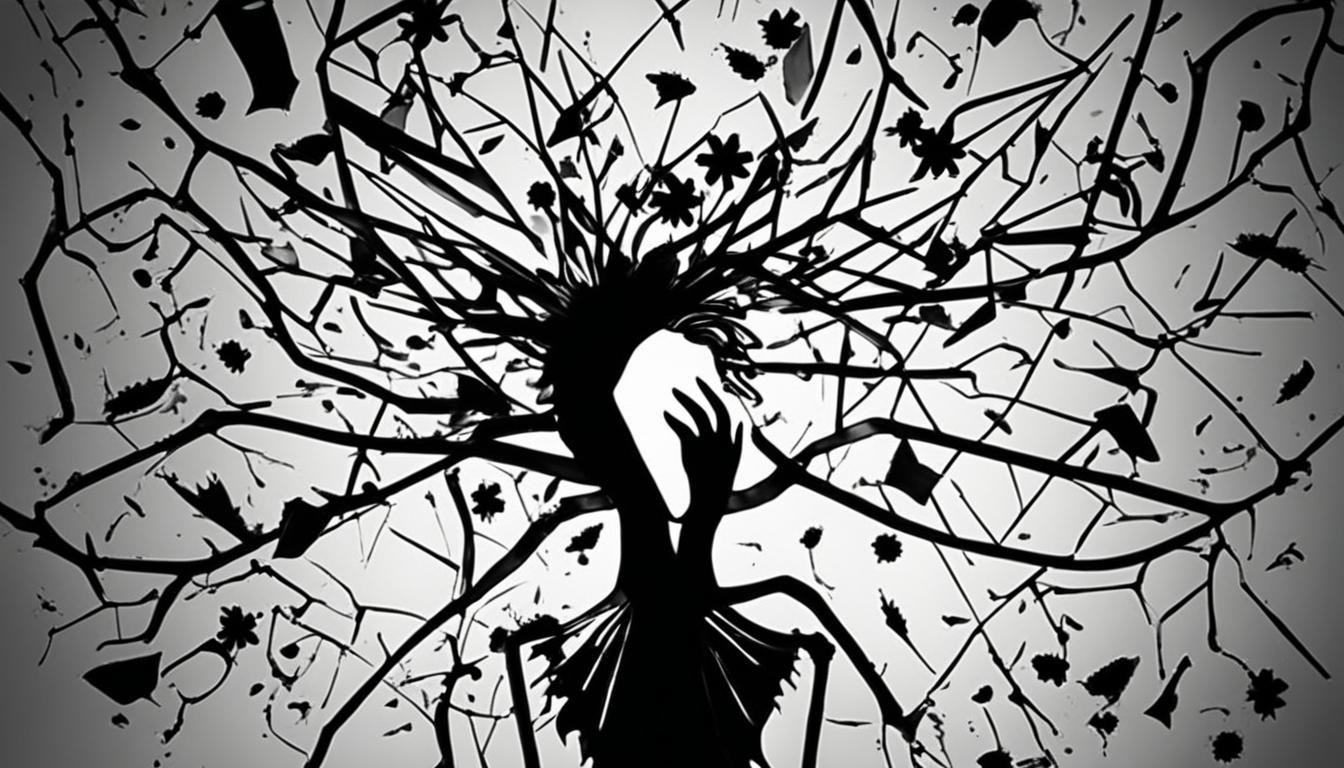Toxic relationships harm your mental and physical health. It doesn’t matter if it’s an intimate relationship, a friendship, or a family bond. Spotting the early warning signs is key to keeping yourself happy and safe.
Seeing these signs early can help you make smart choices for your relationship. This way, you can protect yourself when needed. Below are 11 red flags that could mean your relationship is toxic:
Key Takeaways:
- Recognizing toxic relationship signs is key to your well-being and safety.
- Bad communication can cause misunderstandings and lack of empathy, leading to problems.
- If you don’t feel supported, it might hinder your growth and lead to feeling alone.
- Jealousy hints at deep insecurity and trust issues in the relationship.
- Someone being controlling or possessive limits freedom, making the relationship unhealthy.
Toxic Communication
Toxic communication shows a relationship is unhealthy. It’s about being mean or hurtful instead of understanding the other person. This can come from not solving past problems, unequal power, or not knowing how to deal with emotions. It’s really important to know if the way you talk is toxic so you can make things better.
A major sign of toxic communication is always interrupting or talking over your partner. Do this, and you’re not showing respect or care for what they have to say. It makes people feel like their thoughts and emotions don’t matter.
Not respecting boundaries is another big issue in toxic talk. This means not valuing your partner’s opinions, not giving them room to speak, or being mean during fights. It leads to more hurt feelings and keeps the bad feelings going.
This bad way of talking often leaves both people feeling unhappy. It stops them from growing closer or solving problems. When talking breaks down, both sides can feel alone and frustrated, which isn’t good for a relationship.
To get better, you need to listen well and speak openly. Listening well means really paying attention to your partner, trying to see things from their side, and answering nicely. This helps understand each other and feel closer. Speaking openly means you both can share what’s on your mind without fear. This kind of talk makes it safe to work through problems and get stronger together.
Effective Communication Strategies
- Practice active listening: Give your partner your full attention and avoid interrupting or formulating responses while they are speaking.
- Use “I” statements: Express your thoughts and feelings using “I” statements to avoid blaming or attacking your partner, fostering a more constructive conversation.
- Show empathy: Try to understand your partner’s point of view and validate their emotions, even if you don’t agree.
- Take responsibility for your words and actions: Acknowledge when you may have communicated in a hurtful or toxic manner, and apologize sincerely.
- Seek professional help if needed: If toxic communication persists despite your efforts, consider seeing a couples therapist to gain insights and learn effective communication techniques.
- Practice active listening: Give your partner your full attention and avoid interrupting or formulating responses while they are speaking.
- Use “I” statements: Express your thoughts and feelings using “I” statements to avoid blaming or attacking your partner, fostering a more constructive conversation.
- Show empathy: Try to understand your partner’s point of view and validate their emotions, even if you don’t agree.
- Take responsibility for your words and actions: Acknowledge when you may have communicated in a hurtful or toxic manner, and apologize sincerely.
- Seek professional help if needed: If toxic communication persists despite your efforts, consider seeing a couples therapist to gain insights and learn effective communication techniques.
Working on talking better can change a bad pattern into a good one. This makes your relationship happier and closer.
Lack of Support
In a toxic relationship, the absence of support can lead to codependent behavior. This can destroy the basis of a good partnership. Instead of having a supportive partner, you might feel undermined all the time.
Hesitating to share good news with your partner is a common sign of a lack of support. You might worry about their reaction or fear they’ll downplay your achievements. This worry is a product of a toxic environment where success isn’t celebrated.
Furthermore, constant negativity during celebrations is a warning sign. If your partner always dampens your joy or disregards your achievements, it shows lack of support. It also points to a toxic setup that harms your well-being.
Healthy partnerships should encourage and celebrate each other. Your partner should be the first to celebrate your success. They should support you and not make your wins about them.
“A supportive partner is like a best friend who not only shares in your victories but also provides a shoulder to lean on during challenging times. They stand beside you as you navigate the ups and downs of life, offering love, encouragement, and unwavering support.”
Breaking Free from Codependent Dynamics
Getting out of codependency starts with dealing with a lack of support. Talking to your partner is key. Explain how you feel and what you need. This opens the door for better understanding.
Couples therapy can also help a lot. A therapist can guide you both in improving communication. They help create a more supportive partnership.
| Signs of Lack of Support | Healthy Partnership |
|---|---|
| Hesitance to share good news | Supportive and positive reactions to achievements |
| Constant negativity during moments of celebration | Shared joy and encouragement during special occasions |
| Dismissal or belittlement of accomplishments | Genuine celebration and pride in each other’s successes |
It’s crucial to recognize and address issues with support in your relationship. Doing so can lead to a stronger and more supportive connection.
Jealousy or Envy
In a good relationship, trust and talking openly are key. But too much jealousy or envy can hurt it. They often come from feeling not good enough or not trusting fully, making things toxic.
Jealousy is fearing others will take what matters from us. Envy is wanting what others have. They can show up as:
- Constant accusations: One partner may wrongly accuse the other of cheating. This false blame can damage trust and cause tension.
- Feeling threatened: If someone feels less important when their partner gets attention, envy is at play. It can lead to always needing to be reassured.
Jealousy and envy often show deeper problems like low self-esteem. People with narcissistic traits can make envy and jealousy worse. They might see their partner’s success as a threat, acting destructively.
“Jealousy is the art of counting someone else’s blessings instead of your own.”
Getting over jealousy and envy takes work from both. Here’s some advice:
- Open dialogue: Talk about what makes you insecure or upset. It helps partners understand each other better.
- Building self-esteem: Focus on yourself to feel more confident. This can cut down envy and jealousy.
- Seeking professional help: Counseling can give you the tools to deal better with these feelings. A therapist can help you both grow stronger and more secure.
Recognizing the Signs and Moving Forward
It’s crucial to see how jealousy and envy harm a relationship. By talking about these feelings and getting help when needed, couples can grow closer and healthier.
Possessiveness or Controlling Behavior
In a relationship, both partners should feel like they matter and can be themselves. Possessive and controlling actions can make things toxic and unbalanced. One person trying to control the other can hurt and cause emotional pain.
Being too controlling shows up in different ways, such as:
- Constantly checking up on and following what the other person does
- Keeping someone away from friends and family so they have less support
- Telling the partner how to act, dress, or think
These acts take away personal freedom and make one feel they’re not their own person. The controlled one may feel stuck and overwhelmed. They might always worry about upsetting the controlling partner.
This kind of influence can lead to bad effects, like lowering self-esteem and feeling worthless. The controlled partner might doubt their choices, beliefs, and lose sight of their dreams and goals.
Knowing the signals of possessiveness and controlling behavior is key to keeping yourself and your feelings safe. Look out for these signs in one-sided relationships:
- Always being asked where you are and what you’re doing
- Having little to no contact with friends and family
- Feeling scared to speak up or not agree with your partner
- Making your partner mad or jealous often
- Being told how to act and what to wear

“Controlling behaviors are like poison in a relationship. They slowly destroy your joy, freedom, and how you see yourself. It’s important to face these harmful actions and get help to get back your freedom and life.”
Spotting possessiveness or control early is key to getting out of a bad relationship. If you or someone you know is going through this, ask for help from pros or friends. You deserve a relationship based on trust, respect, and equality.
Lies and Half-Truths
Dishonesty harms relationships, breaking trust and connections. Telling lies or half-truths weakens a relationship’s bedrock.
When one lies, it causes suspicion and doubt between partners. The innocent one questions themselves, fighting to tell truth from fiction. Gaslighting twists reality and confuses the victim.
Gaslighting is often used by manipulators to control their victim by making them doubt their sanity. It ranges from subtle tricks to bold lies.
“You’re imagining things. I never said that.”
“You must be crazy if you think that happened.”
“You’re just overreacting. It’s all in your head.”
These gaslighting methods dismiss the victim’s feelings, making them feel lost and alone. It chips away at their self-worth over time.
Deceptive tactics are the tools of toxic relationships. Manipulators maintain influence by hiding the truth. Recognizing these signs is key to freedom from abuse.
The Impact of Lies and Half-Truths
Lies and half-truths wreak havoc on trust, well-being, and relationships. They ruin the chance for real closeness and intimacy.
Here are the main effects of dishonesty in a harmful relationship:
- Betrayal: It breaks trust and hurts the innocent person deeply.
- Resentment: Lies build up anger as the truth becomes clear.
- Emotional Instability: It causes anxiety, depression, feeling worthless because of gaslighting.
- Isolation: Victims find it hard to talk to others due to the confusion.
- Fragmented Reality: It shatters self-belief and identity, distorting life.
Spotting lies and half-truths is the first step to end abuse. Turning to family, friends, or therapists for support can help. They offer a way to find clarity and restore self-value.
| The Effects of Lies and Half-Truths | Consequences |
|---|---|
| Betrayal | Deception and emotional wounds |
| Resentment | Increase of negative emotions |
| Emotional Instability | Anxiety, depression, and emotional distress |
| Isolation | Lack of support and confusion |
| Fragmented Reality | Loss of self-confidence and distorted identity |
Recognizing the Signs and Moving Forward
Seeing the signs of a toxic relationship is the first step to get better. These signs could be from deep inside, like mental health problems or past traumas. Knowing what’s at the root can help you understand why bad things happen.
Once you spot these signs, getting help is a smart move. A therapist can save your relationship or help you leave. They offer a place to understand your feelings, see clearly, and learn good ways to cope. A good therapist will help you heal and set healthy boundaries for yourself.
Recognizing these signs isn’t weak—it’s strong. It means you care about your happiness and mental well-being. Whether you try to fix things or move on, remember you should always choose what’s best for you. Trust yourself, get help, and start on the path to a better, happier life.
FAQ
What are some signs of a toxic relationship?
What is toxic communication?
How can I recognize a lack of support in my relationship?
What are some signs of jealousy or envy in a relationship?
How do I recognize possessiveness or controlling behavior in my partner?
What are lies and half-truths in a relationship?
How can I recognize and address a toxic relationship?
Source Links
- https://www.healthline.com/health/toxic-relationship
- https://www.verywellmind.com/toxic-relationships-4174665
- https://www.amenclinics.com/blog/11-warning-signs-youre-in-a-toxic-relationship/








GIPHY App Key not set. Please check settings